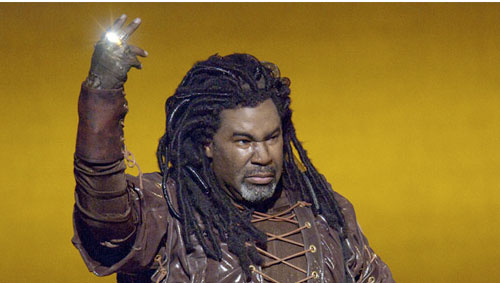If you love opera & Star Trek (and maybe Meatloaf), click on the photo!
The world begins with one note: an E flat.
One note and a horizontal, undulating beam of blue light begins "Das Rheingold," the first installment in Richard Wagner's epic "Ring" cycle. The prelude, or "Vorspiel," is my favorite opening piece of music, a gradual accumulation of strings bubbling steadily upwards, reaching a fevered pitch that can then only be reigned by the crystal-clear voices of three mermaids, swimming in mid-air, bubbles coming from their lips.
Confused yet?
The prelude to "Das Rheingold." It was also used in the opening to Terrance Malick's "Thew New World"
Richard Wagner composed a series of four operas, commonly known as the "Ring Cycle" but known in German as "Der Ring des Nibelugen" (The Ring of the Nibelung). Clocking in at an epic 15 hours, it is loosely based on Norse mythology and follows gods, giants and other mythical creature as they battle over the One Ring, which will "rule them all."
For any opera houses, putting on all four productions is a serious financial undertaking and a sign that the child opera house has become a man, a man that can sing adeptly in German. The LA opera staged its first complete production of the "Ring Cycle" earlier this year, and they coupled it with a months-long Ring Festival.


For any opera houses, putting on all four productions is a serious financial undertaking and a sign that the child opera house has become a man, a man that can sing adeptly in German. The LA opera staged its first complete production of the "Ring Cycle" earlier this year, and they coupled it with a months-long Ring Festival.

And while the LA opera staging was a non-traditional, more modern way of staging it (think light sabers and a headpiece that also doubles as a birdcage, pictured here. The dread-locked gentleman in the first photo turns into the green-headed dwarf when he's in LA. Then again, who doesn't?), the newest production of a Met cannot be entirely called traditional. For one, the set is expensive. Like $16 million and 45-ton expensive. And utilizes video projections. And performers on strings. And horizontal, pivoting beams that act as runways, backdrops, dramatic entrances, and a giant slide.
It's great if you're in the theater and able to see the "machine" (the pet name for the set). But seeing it on a movie theater, via the Met's Live in HD program (which screens its operas in movie theaters around the world), the "machine" comes across as flat and confusing because all you see are large platform coming up with people attached to it.
It's great if you're in the theater and able to see the "machine" (the pet name for the set). But seeing it on a movie theater, via the Met's Live in HD program (which screens its operas in movie theaters around the world), the "machine" comes across as flat and confusing because all you see are large platform coming up with people attached to it.

Huh?
But is the story still affecting? Absolutely. It's about a dwarf who denounces love in order to gain possession of a magical ring. And it's about the corrupt gods who try to take it from him so they can pay the people who build their castle.
It's about the negative repercussions of deceit and manipulation, it's about the darkness of the soul that has no love, it's about the low made high and the high made human-like (though still not quite human). It's about not trying to shaft your contractors. In short, it was enough to make me and my date want to see the next installment ("Die Walkure," The Valkyrie, and do not worry, Tom Cruise will not be in it), coming later this season. I'm looking forward to when this piece of music will finally be played.
And here's an interesting link to Maureen Dowd's very humorous and insightful essay about "Das Rheingold," where she compares it to "The Social Network."
And for any college students interested in seeing a free opera on a movie screen, the Met gives free tickets to showings in NYC, which costs the same as a movie ticket. Free tickets here!


No comments:
Post a Comment